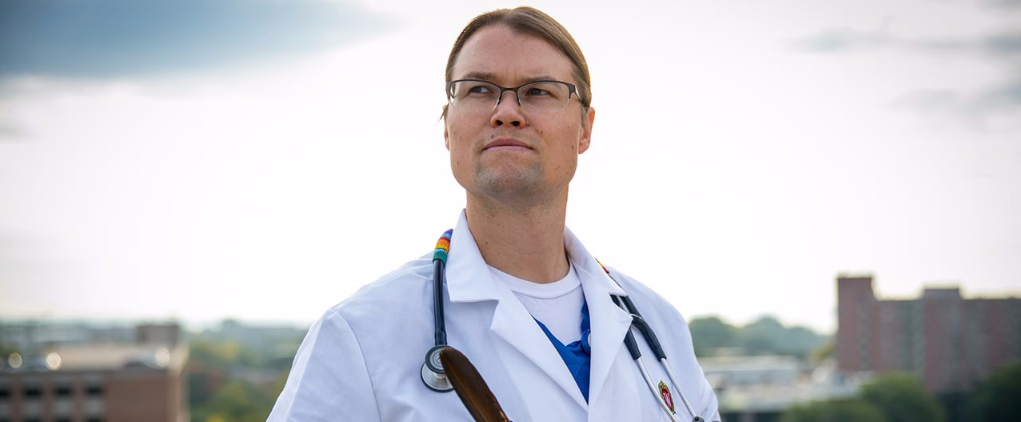The data shows that many more Native American doctors and medical professionals are needed to reduce the tremendous health disparities in Native American communities.
“The challenge for Native people that we face – which is different from the Hispanic community and different from the African-American community – is that, for whatever reason, we tend to be the invisible or the ignored, underrepresented minority. A lot of the issues in places like Wisconsin, the narrative tends to focus on black vs. white,” Dr. Erik Brodt tells Madison365. “Yet, when you look at the data around health disparities and health inequities, as American Indians, we die younger than everybody else and we live with more chronic diseases – heart, lung, and blood diseases – than anybody else.
“But I don’t think our circumstances have the political weight that they do in other groups,” he adds. “So, I think oftentimes we are the invisible minority.”
Brodt is the founder and president of We Are Healers, a 501c3 non-profit initiative featuring stories of American Indian health professionals, that aims is to inspire American Indian youth to envision themselves as dentists, nurses, pharmacists, physicians, etc. – all through stories of Native role-models. Tonight, We Are Healers will be hosting a social event in downtown Madison at Art & Sons from 6-8 p.m. which will let the community know more about who they are and what they do.

Wenona Wolf is a board member for We Are Healers, and is very active in the Madison community talking about and working on Native American issues.
“So many people ask me: What can we do to help? People don’t know where to start. One of the things that I tell people is just to show up. I think this is a great opportunity for people to show up,” Wolf tells Madison365. “There are not a lot of events centered around Native American issues, so this is an event that is and it’s an important one. I would encourage people to come out tonight to support this.”

One of the main challenges that We Are Healers is trying to address is that there are so few Native people who are health professionals.
“The Native people are disproportionately underrepresented, especially in medicine and health careers, and so the impact that that has is much greater than workforce and other issues. You don’t have visible role models for Native youths,” Brodt says. “By having so few Native health professionals available for Native youth to see, it results in this barrier where people won’t see what they can become one day. The idea is to inspire Native youth and show them who they can become one day through the stories of Native people who have gone on this path before and have succeeded on it.
“We Are Healers is a digital media initiative that was initially founded at the UW-Madison School of Public Health,” Brodt adds. “The main goals of We Are Healers are to not only inspire the Native youth to pursue health careers but to connect those students with enrichment programs and to help them along primarily educational pathways. We also advise academic institutions – primarily academic health centers – in how to best recruit, retain, and graduate American Indian health professionals students.”
Brodt was raised in rural, Northwoods Wisconsin. He is the middle child of parents who valued family time and education. “I grew up outside of a small town called Cadott, Wisconsin, and I spent my summers in northern Minnesota on the White Earth Indian reservation and in Bemidji, Minnesota,” he says.
Brodt went to medical school at the University of Minnesota-Duluth and entered the Rural Physicians Associate Program (RPAP) at University of Minnesota where he was placed at the Bemidji North Country Regional Hospital site. He did his residency at Swedish Cherry Hill Family Medicine in Seattle, Washington and is now a family medicine doctor in Portland.

We are Healers has been an initiative for a few years but the 501c3 non-profit first officially launched in January of this year. Its board of directors is made up of a diverse group of people including many Native American physicians from across the country.
“I think that we’re in the early phases of just trying to build a community of people who are interested in supporting Native youths to become health professionals. We’re interested in getting the word out about what we’re doing as well as building a network of people who believe in the movement that we’re trying to be a part of,” Brodt says. “Ultimately, it’s about bringing health and wellness to our communities – not just through access to care and access to health providers but by infusing the number of Native people who are role models and are people in the community that have jobs that promote economic development and can be leaders. It’s part of a larger movement to address social determinants in health.”
Tonight’s event will feature Indigenous food prepared by a local chef. Wolf encourages community members to come by and try some walleye and wild rice hunted and gathered in northern Wisconsin.
“We’ll have indigenous food and cocktails,” she says. “What more can you ask for? It will be a fun and interesting event.”
Brodt hopes that tonight’s event will help inspire Native American youth to pursue careers in the medical field. He’s hoping that it inspires the greater community, too.
“This is an event for everybody. Anybody who is interested in learning more about what we’re doing … that’s who it is for,” he says. “If there are Native youth in the community who want to learn about what we are doing or to meet providers and Native leaders or if somebody is interested in supporting education and the dreams of Native youth, that’s who this event is for.
We Are Healers Madison Meetup will take place Thursday, Nov. 2, 6-8 p.m. at Art & Sons, 408 E. Wilson in downtown Madison.




























